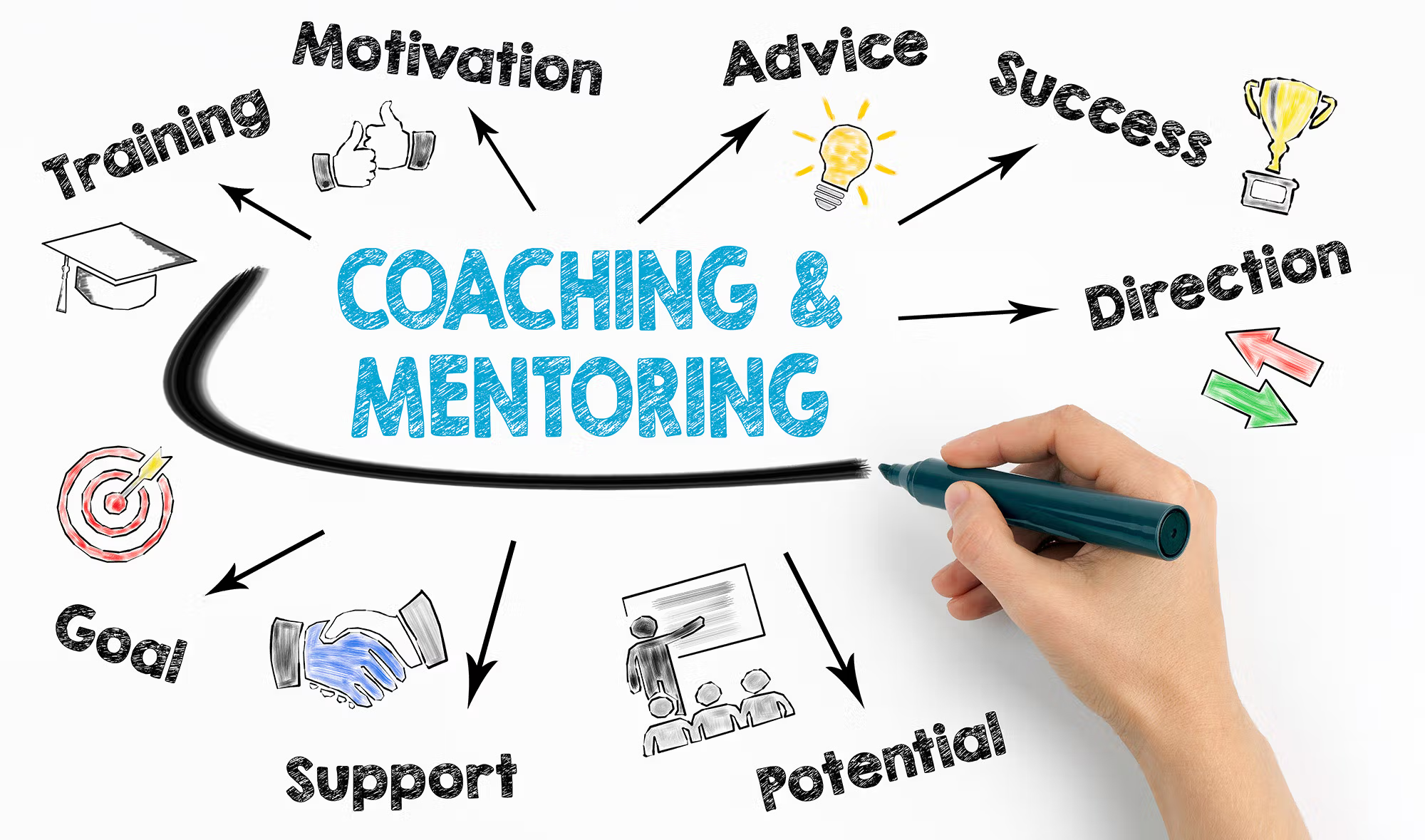Business coach and mentor: what is the difference?
By Julian Lewis • October 27, 2022

As a business owner or organizational leader, you know that it takes more than simply having an idea to be successful. You have to put in the hard work and dedication necessary to ensure that the business is seeing growth and success. Once you reach a plateau or are looking for ways to take things to the next level, you might be wondering which type of professional you should turn to: a coach or mentor.
While there are many similarities between the two - both can offer guidance and support through the early stages of building your business or navigating relationships within large organizations as you advance your career. In this post, we will explore what these differences are and help you decide which one might be right for you.
What is the difference between a business coach vs mentor?
At their core, business coaches and mentors both have the same goal - to help you succeed in your business and achieve more success. However, there are key differences between the two that can make one or the other more appropriate for your specific situation.
A business coach provides advice that typically focuses on helping you create systems and processes that enable your organization to run smoothly and effectively.
This might include things like setting up marketing campaigns, creating sales funnels, or enhancing your customer service processes.
Business coaching defined and explored
Business coaching is a professional relationship in which a coach can provide guidance and help you step out of your comfort zone to achieve your business or leadership development goals.
This can include everything from developmental activities to help you manage difficult employees or make better business decisions to scale your organization.
Coaches are often former business leaders who were successful in leadership mentoring or coaching clients in companies they previously worked for. They usually have deep coaching skills and expertise in a particular area of business - for example, operations, marketing, or sales. They also tend to be passionate about personal development and transitioning into coaching other executives or leaders is a natural fit. For more coaching and mentoring blogs, check out our Life and career coaching FAQs to learn more.
Executive mentoring defined and explored
Executive mentoring is a relationship in which an experienced professional provides resources, expertise, and advice to help you achieve your business or career goals. This can include everything from helping you create strategies to working through challenges within your organization. They can provide encouragement and motivation when times get tough which can spill into our personal lives.
The importance of mentoring programs

Executive Mentoring is a key component of many successful companies and has been shown to be an effective way to help leaders and professionals develop soft skills to reach their full potential and achieve their goals. Mentors can help mentees navigate the various stages of a career, or work through personal and career development challenges.
1- Corporate Mentorship Programs Build Leadership Skills
Mentoring programs can develop managers into senior leaders. A well-mentored company will have leaders and senior executives use their skills to aid in the skills development of mentees for senior leadership roles within an organization. A successful executive mentoring relationship is invaluable for retention and succession planning.
2- Mentorship Provides Clarity In Vision and Mission
Mentors provide a fresh perspective: Executive mentoring offers a different perspective on work-related challenges, often bringing in new ideas and insights that can help you create more effective solutions. An experienced mentor will provide a successful mentoring relationship that is a part coach and part mentor that helps mentees to connect to their personal vision and mission and discover a career that is purposeful.
3- Executive Mentoring Programs Boost Confidence and Charisma
Mentors provide motivation and encouragement: Experienced executive mentors can also be an important source of support to a mentee when they need it most. Whether you are facing challenges within your company or simply looking for ways to stay motivated and focused on achieving your goals, having an executive leader who is your mentor within the same company can make all the difference.
4- Corporate Mentorship Programs Provide A Clear Career Path
A key benefit of mentoring sessions is that they help you develop a clear career path, both within your company and in your field more broadly. This can be helpful for young professionals who are new to the business world and seeking to establish a mentoring relationship with senior executives and guidance for their careers.
How do I structure a mentorship program?

There is no one-size-fits-all approach to structuring a mentorship program, as the needs and goals of different businesses will vary. Here are some key considerations to include in your mentor program.
1- Determine the purpose of the program
The first step in structuring a formal program is to define your overall goals and objectives. This will help you identify the type of effective mentor that is best suited to your needs, as well as establish clear guidelines and expectations for the program for the executive mentors and mentees.
2- Identify the program participants
In order to be effective, there should be a diverse group of mentors with relevant experience and expertise in your industry or field who want to help with professional development. Additionally, it is important to consider factors such as personality and communication style, as these can influence the success of the program.
3- Establish the program format
Once you have identified suitable mentors to build employees' relationships and careers, it is important to establish clear guidelines and expectations for the mentees' participation in the executive mentoring program. This might include setting specific goals, establishing a merchant account for coaching and mentoring, or determining how feedback will be provided and evaluated.
4- Define the program style
Another key consideration when structuring a mentorship plan is determining the style of the program. This may include deciding on specific topics to be covered, establishing group or one-on-one meetings, or choosing appropriate resources for sharing relevant information and materials. Additionally, this could include a peer mentoring program or the utilization of mentoring software to streamline participation.
5- Decide the topics to discuss in The Program
In order to be effective, mentors should provide relevant information that supports the needs and goals of the mentee. As such, it is important to clearly communicate the topics you would like to discuss during each meeting or session.
6- Measure the performance of the participants
Finally, it is important to regularly measure the business performance and progress of both mentors and mentees in the mentorship plan. This can help you gauge the effectiveness of the program, as well as identify areas where adjustments or improvements may be needed.
How do I get busy executives to join my mentoring program?

One approach to attracting busy executives to your mentoring program is to emphasize the benefits of participating. Becoming a coach or mentor can have many benefits, including the potential for career growth, the opportunity to develop new business skills and knowledge, the chance to build a meaningful coaching or mentoring relationship with other professionals in your industry, and the ability to make a difference in the lives of their mentee. You might also consider offering some sort of peer mentoring or mentor coaching program.
4 common executive mentoring mistakes to avoid
1. Failing to set clear expectations and guidelines for an organization's program. This can result in confusion or frustration on the part of the mentor and mentee, as well as disruptions to the business training schedule or goals.
2. Underestimating the time commitment involved in participating in a mentorship plan. Many busy executives are reluctant to commit significant time to mentoring, as they may be focused on other priorities or deadlines.
3. Not providing adequate support throughout the executive mentoring program. It is important to offer ongoing guidance and assistance to both a mentor and mentee during the process. This can help ensure that everyone remains motivated and committed to achieving their shared goals.
4. Focusing too much on formal progress and evaluation measures. While it is important to track the progress of both mentors and mentees, it is also important not to lose sight of the more intangible benefits that can result from participating in a mentoring program. This might include improved communication skills, enhanced self-awareness, or strengthened professional networks.
Conclusion
To successfully attract busy executives to your executive mentoring or executive coaching plan, it is important to focus on the benefits of participation and emphasize the value of support and guidance from experienced professionals. You should consider hiring a life and business mentorship coach to provide ongoing guidance and assistance throughout the program, as well as be flexible in your approach to scheduling, communication, and evaluation.
Read more about: Executive Coaching
About Julian Lewis
Julian Lewis is a driven and accomplished professional with a passion for driving positive change in the business world. He is the co-founder and COO at Zella Life.
His own experience as a professional of color in a Fortune 500 company led him to discover the limitations for advancement that many professionals like himself face. Determined to reach his full potential, Julian became an established business coach and entrepreneur, committed to supporting others in their pursuit of personal and professional growth.
Today, Julian is a recognized corporate trainer, coach, and leader, known for his ability to leverage real-life experiences and evidence-based methodologies to affect positive change within individuals and organizations. As the leader of Zella Life's coaching division, he is dedicated to empowering individuals and businesses to achieve their full potential.